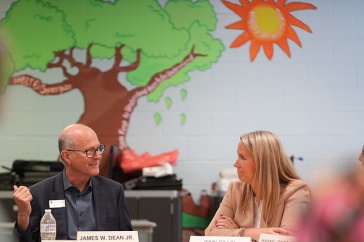
Leadership isn’t just about getting people to do what you want them to by barking orders or simply assuming the title of boss. It’s nuanced; a carefully studied skill that takes practice, an ability to take risks and the willingness to be wrong sometimes.
And that’s just what a group of area high school students set out to learn at a day-long workshop Friday, Nov. 6, hosted by the University of New Hampshire at Manchester and the group, Leadership Empowering Authentic Progress-- or LEAP.
“Essentially [the students] are going to explain to us what the problems are in their school and what they can use leadership to fix,” says Alex Craven, a 17-year-old senior at Souhegan High School and a member of LEAP. “We will be teaching them all of these leadership skills that they can apply to their school and community and hopefully work on it for the better.”
LEAP was founded by the Souhegan High School Ethics Forum in Amherst in partnership with UNH Manchester. The goal of the workshop was to help the students who came from Gilford, Raymond and Spaulding Memorial high schools to refine their leadership skills, learn how to address real world problems, connect with successful community leaders and ultimately, as Craven says, take what they learned back to their communities.
“The biggest thing that most people see as leadership is standing up in front of a bunch of people, being big, being strong,” says Sam Bannon, 17, who is also a member of LEAP and a senior at Souhegan. “So the whole point of today is not just to show people how to be a leader, but the different kinds of leaders they can be. Whether they’re an introverted person or extremely social, whatever their skill set may be, the whole point is to reach out to them and show them what they can do.
"That’s the whole idea of empowerment, that’s what LEAP is all about, we’re going to show them what they can do.”
To that end, LEAP keynote speaker, Staff Sergeant Ryan Pitts, Medal of Honor recipient and a graduate of both Souhegan High School and UNH Manchester, probably could have regaled students with tales of bravery and leading his troops into and out of battle. Instead, he spoke to them about one of the biggest mistakes he ever made in the service.
He told them of a time that, believing his fellow soldiers had been injured in by an Improvised Explosive Device while driving down the road in Afghanistan, Pitts broke protocol and announced there had been an IED attack and the need for medical help over a tactical radio channel. This action, called a nine-line, brings all radio traffic and action in the war to a halt while everyone waits to hear what has happened and help is called out.
The problem was, he was wrong. The driver had just been going too fast and had a rollover accident. The point of his story was two-fold: first, his supervisors didn’t berate him for his mistake. Instead, they treated him with respect and tried to teach him what he should do differently next time. They also recognized that, though what he did was wrong, he showed initiative and that this act along with his others shows of leadership, proved to them he should go for a chance to move up in rank and become a supervisor.
Pitts explained, one of the critical skills of being a leader is knowing how to fail forward, being willing to try something new and take a risk, but also willing to learn from mistakes. He also explained that becoming a leader wasn’t just something that happened to him, he had to learn how to do it. And he did that by taking lessons, both good and bad, from the leaders around him.
“All this time I spent leading,” Pitts says. “It was a continuous evolution….I was never done learning how to lead or learning from others. I think I learned just as much from that bad first leader I had that was volatile and inconsistent than I did from the really good leaders."
“When I think about the great principles of leadership, the Army has a great acronym to summarize the Army values. And the acronym is actually LDRSHIP. Loyalty, duty, respect, selfless service, honor, integrity and personal courage. Characteristics I think every good leader should have,” said Pitts.
Pitts also told students that it’s important to remember no leader does his or her work alone, and that he or she is reliant on the work of the team to move forward.
The power of a great partnership is something that stood out to Craven as he acknowledged the tremendous advantage LEAP had through its partnership with UNH Manchester. And Bannon added, “We wouldn’t be able to do this without them. UNH Manchester and Durham, they’ve both been super helpful. They’ve been super generous with money and time and facilities. They are pretty much the reason all of this is able to happen.”
As for the students attending the event, says Marisa Forti, Director of Student Development at UNH Manchester, learning these skills at such an early stage of their academic careers will serve them well in the long run.
“A lot of leadership is learned by experience and by trying things out and figuring out what doesn’t work and then figuring out what works for you and your leadership style,” she says. “So the more you can practice it proactively, the more you can really hone what your craft is, what your direction is and what your skills are. So I think the earlier you start and the more aware you are of leadership styles, and leadership traits and skills, the better able you are able to practice those over time to really get to what your direction is and really get to your concrete leadership style.”
Written by Melanie Plenda



















































